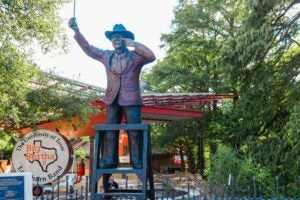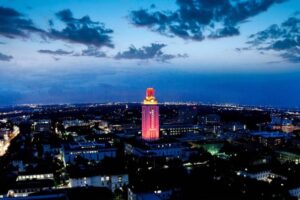AUSTIN, Texas — The International Symposium on the Spanish Language will bring distinguished scholars and business leaders from a dozen Latin American and Caribbean countries, Spain and the United States to The University of Texas at Austin campus in April to discuss the present and future state of the Spanish language throughout the world.The April 1-4 symposium at the Lyndon B. Johnson School of Public Affairs and Flawn Academic Center will feature three days of programs open to the public as well as some private academic meetings. The event is co-chaired by Professors Joseph Matluck and Carlos Sole’ of the department of Spanish and Portuguese at UT Austin.
The public portion of the symposium begins April 2 with a 9 a.m. ceremony at the LBJ Bass Lecture Hall. UT Austin President ad interim Peter T. Flawn will deliver the opening remarks. Over the next three days, the public is invited to register and attend a number of free lectures, panels and roundtable discussions on a variety of topics including:
A private session of importance to the Spanish-speaking world and all who interact with it, is the April 1 working meeting of the Executive Commission of the Norma Culta Project — a monumental 30-year-old research initiative into the urban manifestation of the Spanish language across place and time through the recording and analysis of the speech of citizens of select major cities throughout the Hispanic world. Its ultimate goal is to arrive at language usage standards, or norms for the separate countries æ each of which has its own academy of scholars dedicated to that purpose.
“Whenever you have that many politically separate countries speaking the same language in slightly different ways, you’ll have language politics,” said Matluck. “It’s a hot issue everywhere, the question of language unity versus diversification. . .who sets the standards, where they’re set up. . . “
Spain will manifest a strong presence, with delegates from two mainland cities and Las Palmas de Gran Canaria. In recognition of the nation’s position with respect to the history of the language, one session will be devoted to The Generation of ’98, a group of intellectuals active between 1890 and 1910 but named for the year in which Spain lost its last remnants of empire. On both sides of the Atlantic, these writers, artists and thinkers pondered deeply the enveloping spiritual crisis brought about by the once-powerful country’s decline as the century drew to a close, and through their works, made an enduring contribution to the richness of the Spanish language.
The symposium is sponsored by the Office of the President, the College of Liberal Arts, the department of Spanish and Portuguese, and several other academic centers and public and private entities.
For additional information, contacts in the department of Spanish & Portuguese are Professor Joseph Matluck at (512) 452-3364, or Professor Carlos Sole’ at (512) 471-4936.



